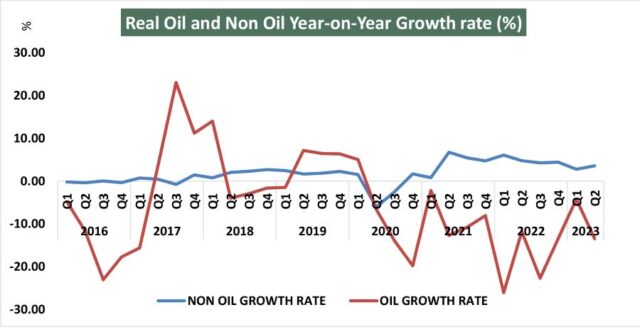MON, AUGUST 28 2023-theGBJournal |The Gross Domestic Product (GDP) growth [in real terms] improved marginally by 20 bases points from 2.31% in the first quarter of 2023 to 2.51% in the second quarter.
However, it slowed when compared to second quarter of 2022 which was 3.54%. The economy slowed amid shocks from current economic reforms which impacted energy prices and the naira exchange rate.
The adverse impacts of the reforms were disproportionately higher than expected. However, a rebound of the economy is expected in the medium to long term as current distortions in the economy are corrected.
Meanwhile, there is an immediate positive outcome which is the marked improvement in the fiscal space of governments at all levels.
Meanwhile, the dominance of the non-oil sector was underscored by the report. The sector contributed 94.7% to GDP while the oil sector contributed 5.3%. The service sector continued to maintain its dominant role in the economy with a contribution of 58.4% of GDP.
The structure of the economy continued to reflect its vulnerabilities, especially the challenges of productivity and competitiveness of the real economy.
The Q2 GDP growth fell short of the sub-Sahara projected average of 3.1% for 2023; but better than projections for the Euro Zone of 1% and the United States of 1.8%.
Sectors that grew in first quarter
These are sectors that recorded better growth performance in the second quarter than the first quarter.
These sectors include Quarry and Minerals which grew by a staggering 39.2%; financial institutions 29.2%; Rail Transport, 16.9%; Insurance, 7.3%; Trade, 2.4%; Construction, 3.5%; Manufacturing , 2.2%; Education, 1.4%; Real Estate, 1.9%; Chemical and Pharmaceutical, 6.4%; Food and Beverage Sector, 4.3%; Cement 3.3%; Plastics, 2.7%; Iron and Steel, 2.3%; Agriculture, 1.5%; Fishing, 0.29%.
Sectors that slowed
These are sectors that recorded positive but lower growth than in the previous quarter. These sectors include ICT, 9.7%; Air Transport, 4.3%; Crop Production, 1.8%; Wood and Wood products, 2.4%; Paper and Publishing, 1.4%; Water Transport, 5.4%;
Sectors that contracted
These are sectors that recorded negative growth in the second quarter. The output in the sectors contracted because of the prevailing economic and investment climate conditions. Road transport sector recorded the biggest contraction of 55% in the second quarter.
Other sectors that contracted include Coal Mining which contracted by 15.7%; Motor vehicle Assembly, 3.9%; Music and Motion Pictures, 2%.
Sectors in Recession
These are sectors that contracted in the first two quarters of 2023. They are the sectors that have been stumbling because of macroeconomic , structural or policy issues. Oil refining contracted by 35.6%; Livestock, 2.3%; Crude Petroleum and Gas, 13.4%; Textile, 4.4%.
Growth in these sectors continued to be subdued by heightened inflationary pressures, exchange rate volatility, spiking energy cost, insecurity and the political economy of the oil and gas sector.
Conclusion
The Nigerian economy is still going through corrective reforms to remove some fundamental distortions and restore the economy back to the path of recovery and growth. But implementing the reforms is an arduous task.
The trade offs are profound and the social impact has been devastating. Given the inevitability of the reforms, the implementation calls for a delicate balancing act and strategic sequencing to ensure an inclusive economic transition.
Dealing with the issues of insecurity, spending priorities, corruption, productivity and competitiveness, regulatory environment and macroeconomic stability are paramount to rebuilding the momentum of economic growth and development.
This comment is provided by the Centre for the Promotion of Private enterprise (CPPE).
Twitter-@theGBJournal|Facebook-the Government and Business Journal|email:gbj@govbusinessjournal.com| govandbusinessj@gmail.com










